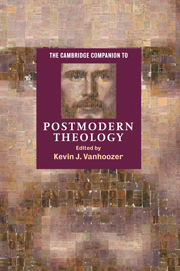Book contents
- Frontmatter
- Part 1 Types of postmodern theology
- 1 Theology and the condition of postmodernity
- 2 Anglo-American postmodernity
- 3 Postliberal theology
- 4 Postmetaphysical theology
- 5 Deconstructive theology
- 6 Reconstructive theology
- 7 Feminist theology
- 8 Radical orthodoxy
- Part 2 Christian doctrine in postmodern perspective
- Index
5 - Deconstructive theology
from Part 1 - Types of postmodern theology
Published online by Cambridge University Press: 28 May 2006
- Frontmatter
- Part 1 Types of postmodern theology
- 1 Theology and the condition of postmodernity
- 2 Anglo-American postmodernity
- 3 Postliberal theology
- 4 Postmetaphysical theology
- 5 Deconstructive theology
- 6 Reconstructive theology
- 7 Feminist theology
- 8 Radical orthodoxy
- Part 2 Christian doctrine in postmodern perspective
- Index
Summary
In 1982 a group of American theologians, schooled in philosophy of religion (particularly the death-of-God thinking from Hegel and Nietzsche and the linguistic turn taken by Wittgenstein and Heidegger) encountered the work of Jacques Derrida and saw the potential of deconstruction for furthering their project of announcing the end of theology. A book emerged, Deconstruction and Theology, edited by Thomas Altizer, featuring essays by the most prominent of them: Thomas J. J. Altizer, Mark C. Taylor, Robert Scharlemann, Charles Winquist, Max Meyer, and Carl Raschke. In the same year Mark C. Taylor published his full length study Deconstructing Theology, to be followed in a collection under his editorship Deconstruction in Context in 1986. Of course, Derrida's work (along with Paul de Man's) was taking the American literary world by storm from the mid seventies when English translations of his work began to appear. And the influence of Derrida's thinking on those schooled in hermeneutics, and primed for the next move that might be made following Gadamer's Truth and Method, was beginning to be felt earlier than 1982.
- Type
- Chapter
- Information
- The Cambridge Companion to Postmodern Theology , pp. 76 - 91Publisher: Cambridge University PressPrint publication year: 2003
- 2
- Cited by

